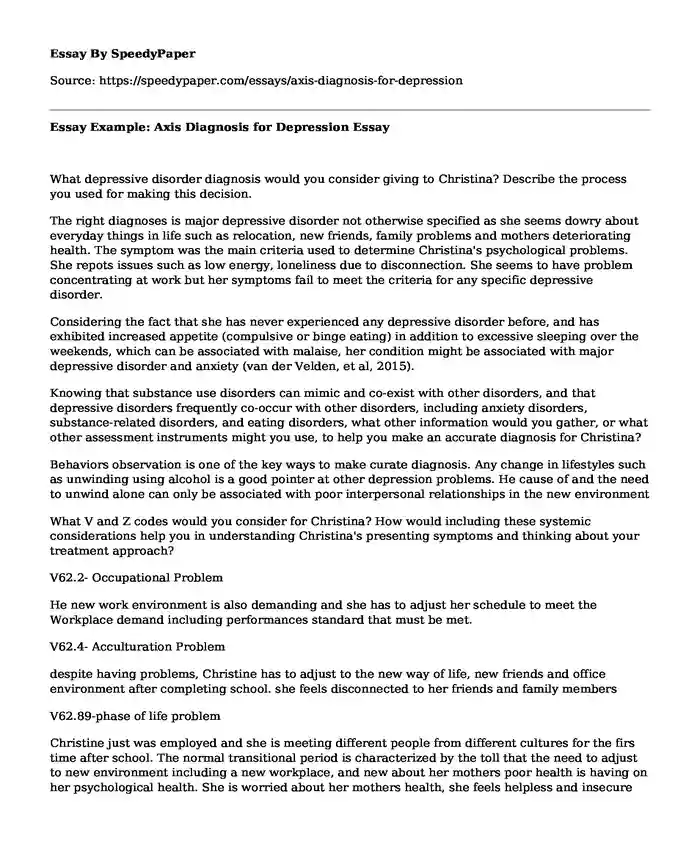
| Type of paper: | Essay |
| Categories: | Mental health Depression Psychological disorder |
| Pages: | 3 |
| Wordcount: | 623 words |
What depressive disorder diagnosis would you consider giving to Christina? Describe the process you used for making this decision.
The right diagnoses is major depressive disorder not otherwise specified as she seems dowry about everyday things in life such as relocation, new friends, family problems and mothers deteriorating health. The symptom was the main criteria used to determine Christina's psychological problems. She repots issues such as low energy, loneliness due to disconnection. She seems to have problem concentrating at work but her symptoms fail to meet the criteria for any specific depressive disorder.
Considering the fact that she has never experienced any depressive disorder before, and has exhibited increased appetite (compulsive or binge eating) in addition to excessive sleeping over the weekends, which can be associated with malaise, her condition might be associated with major depressive disorder and anxiety (van der Velden, et al, 2015).
Knowing that substance use disorders can mimic and co-exist with other disorders, and that depressive disorders frequently co-occur with other disorders, including anxiety disorders, substance-related disorders, and eating disorders, what other information would you gather, or what other assessment instruments might you use, to help you make an accurate diagnosis for Christina?
Behaviors observation is one of the key ways to make curate diagnosis. Any change in lifestyles such as unwinding using alcohol is a good pointer at other depression problems. He cause of and the need to unwind alone can only be associated with poor interpersonal relationships in the new environment
What V and Z codes would you consider for Christina? How would including these systemic considerations help you in understanding Christina's presenting symptoms and thinking about your treatment approach?
V62.2- Occupational Problem
He new work environment is also demanding and she has to adjust her schedule to meet the Workplace demand including performances standard that must be met.
V62.4- Acculturation Problem
despite having problems, Christine has to adjust to the new way of life, new friends and office environment after completing school. she feels disconnected to her friends and family members
V62.89-phase of life problem
Christine just was employed and she is meeting different people from different cultures for the firs time after school. The normal transitional period is characterized by the toll that the need to adjust to new environment including a new workplace, and new about her mothers poor health is having on her psychological health. She is worried about her mothers health, she feels helpless and insecure
What social, cultural, and systemic factors would be important for you to consider when assessing and diagnosing Christina? How is the separation from her mother, family, and home affecting her? What multigenerational issues might be affecting Christina at this time?
Social factors include self-esteem issues and poor interpersonal relationships at the new place of work since she started drinking, bingeing and feeling worthless after she graduated.
The main multigenerational issues include the lazy stereotypes, cultural expectations and shock, as well as poor communication styles might affect the hr relationships with the other people at work. She is a millennial entering a workplace, which possible has mostly baby boomers, generation Y, and generating X (Maj, 2008). The separation from her family and friend is also affecting he as she s worried about the mothers poor health and has difficulty forming new relationships despite being much liked by the new friends.
References
Maj, M. (2008). Delusions in Major Depressive Disorder: Recommendations for the DSM-V.Psychopathology, 41(1), 1-3. http://dx.doi.org/10.1159/000109948
van der Velden, A., Kuyken, W., Wattar, U., Crane, C., Pallesen, K., & Dahlgaard, J. et al. (2015). A systematic review of mechanisms of change in mindfulness-based cognitive therapy in the treatment of recurrent major depressive disorder. Clinical Psychology Review, 37, 26-39. http://dx.doi.org/10.1016/j.cpr.2015.02.001
Cite this page
Essay Example: Axis Diagnosis for Depression. (2019, Sep 16). Retrieved from https://speedypaper.net/essays/axis-diagnosis-for-depression
Request Removal
If you are the original author of this essay and no longer wish to have it published on the SpeedyPaper website, please click below to request its removal:
- Web-Based Training Design for Human Resources, HRM Essay Sample
- Essay Example on Clinical Guidelines for Health Promotion
- Human Development and Life Transition Issues - Free Essay in Psychology
- Barbarian Days by William Finnegan - Free Essay with a Book Review
- Abraham Lincoln and Religion: 1861-1865, Free Essay for Everyone
- Free Essay with the Overview of the Religious Beliefs of the Indigenous People Arawak, Caribs and Maya
- Free Paper Sample on Inherited Disease
Popular categories




